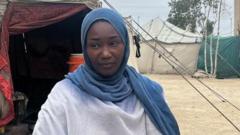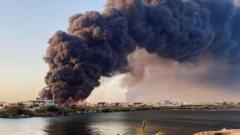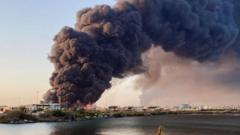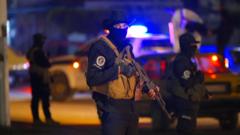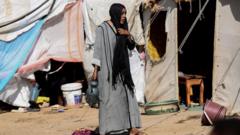In the wake of the Syrian Civil War, as new alliances form, the Druse community advocates for protections amid uncertainty over the country's future.
Druse Seek Assurance in Post-Assad Syria Amid Uncertain Future

Druse Seek Assurance in Post-Assad Syria Amid Uncertain Future
As Western powers consider new alliances, Syria's religious minorities express concerns for their safety.
The Syrian civil war has reached a critical juncture following the ousting of President Bashar al-Assad, and with this transformation, various groups are placing their hopes in a more tolerant and inclusive Syria. Recently, the Druse community, a religious minority comprised of about 1.2 million members within Syria, took proactive measures to safeguard their rights and ensure their future in the rapidly changing political landscape.
Sheikh Muwafaq Tarif, a key representative of the Druse, made a notable visit to Washington, where he called upon U.S. officials to prioritize the protections of his community during their engagements with the newly established government. He relayed an urgent message, expressing grave concerns for their safety and rights in a post-Assad era. The Druse have historically practiced an offshoot of Shiite Islam and reside not only in Syria but also have significant populations in Lebanon, Israel, and Jordan.
The civil war’s shift saw the rise of the Islamist group Hayat Tahrir al-Sham, which played a crucial role in the rebellion against Assad, yet remains labeled as a terrorist organization due to its previous ties with Al Qaeda and the Islamic State. While these leaders have publicly renounced their former associations and profess a commitment to religious tolerance, many minority groups, particularly the Druse, approach such claims with skepticism. Sheikh Hikmat al-Hajari, the spiritual leader of the Druse in Syria, articulated his community's apprehensions by questioning the integrity of the newly declared promises from the government.
As international parties, particularly Western diplomats, show willingness to engage with the rebels now in power, the Druse's fight for recognition underscores the complex challenges facing Syria as it embarks on a path of reconstruction and healing. Their ongoing diplomatic efforts highlight the critical need for inclusivity and the protection of minority groups in the new political framework, not only for their survival but for the future stability of the country.
Sheikh Muwafaq Tarif, a key representative of the Druse, made a notable visit to Washington, where he called upon U.S. officials to prioritize the protections of his community during their engagements with the newly established government. He relayed an urgent message, expressing grave concerns for their safety and rights in a post-Assad era. The Druse have historically practiced an offshoot of Shiite Islam and reside not only in Syria but also have significant populations in Lebanon, Israel, and Jordan.
The civil war’s shift saw the rise of the Islamist group Hayat Tahrir al-Sham, which played a crucial role in the rebellion against Assad, yet remains labeled as a terrorist organization due to its previous ties with Al Qaeda and the Islamic State. While these leaders have publicly renounced their former associations and profess a commitment to religious tolerance, many minority groups, particularly the Druse, approach such claims with skepticism. Sheikh Hikmat al-Hajari, the spiritual leader of the Druse in Syria, articulated his community's apprehensions by questioning the integrity of the newly declared promises from the government.
As international parties, particularly Western diplomats, show willingness to engage with the rebels now in power, the Druse's fight for recognition underscores the complex challenges facing Syria as it embarks on a path of reconstruction and healing. Their ongoing diplomatic efforts highlight the critical need for inclusivity and the protection of minority groups in the new political framework, not only for their survival but for the future stability of the country.






